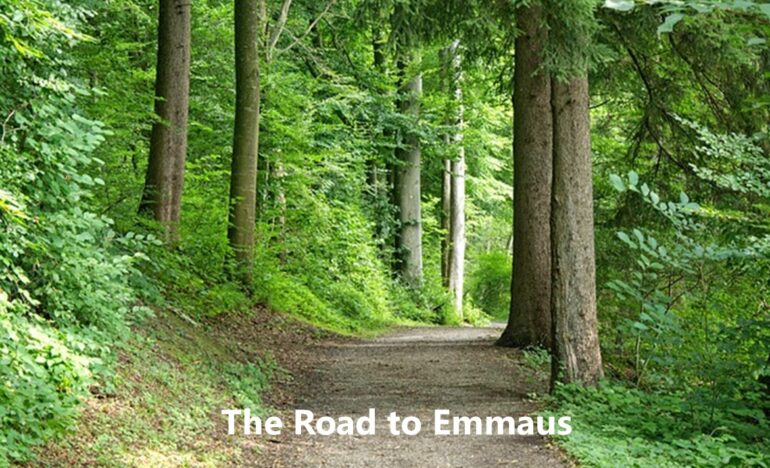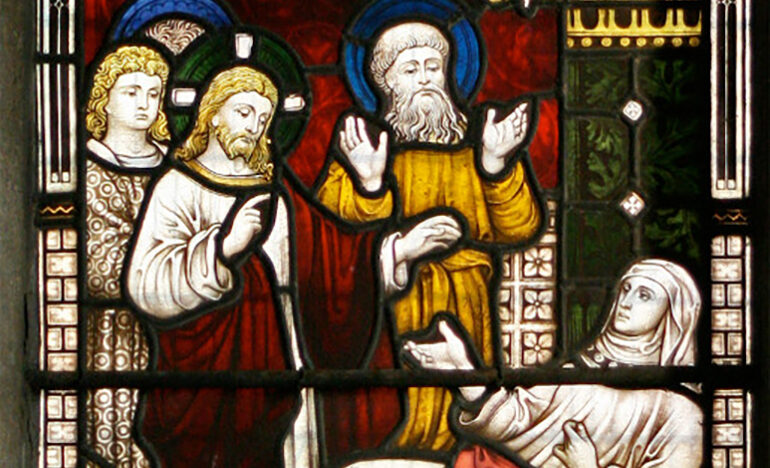Video Series: Walking with Jesus on the Road to Emmaus

By Kathy Keary
Our full series in the Contemplative Prayer Video Series is here.
Revisit earlier articles in our Contemplative Life Series here.
Greetings, I have just returned from my vacation. It was awesome exploring Sedona, the Grand Canyon, and Flagstaff. You can rest assured my camera was a constant companion as I engaged in the practice of contemplative photography with the beautiful landscape that Arizona offers. As great as the vacation was, it is also wonderful to be back home and to be with you today to continue our reflection on the Easter stories.
Using our imagination by placing ourselves in a Scripture passage takes our reflection of the Word of God to a deeper, more powerful level. This practice also enriches the experience of listening to a Bible passage when we gather as a community. I have found that my experience of entering into a particular scene will resurface with all the emotion that I originally attached to it when I hear the passage again. I will recall words that Jesus spoke to me evoking the feelings that stirred within me at the time.
Today I will invite you to use your imagination as we travel through the Emmaus story, one of my favorite Easter passages. As you may recall, Jesus walks with two of his followers on the road to Emmaus. One of them, Cleopas, is named. The other one is not. We have no idea if it is a man or a woman. I invite you to place yourself in the sandals of the unnamed disciple.
The passage is rather long. I will read it and intersperse ideas to ponder along the way. Identifying the emotion that is stirring within you will take your meditation to a deeper level.
I invite you to take a few deep breaths inviting the Holy Spirit to guide your reflection as you inhale and emptying yourself of anything that will distract you as you exhale.
Now that very day two of them were going to a village seven miles from Jerusalem called Emmaus, and they were conversing about all the things that had occurred.
Picture the scene in detail. Picture your companion. Visualize what you and your companion are wearing. What does the path look like? What does the landscape look like? What is the weather? Are there any fragrances in the air? What sounds do you hear? What words are spoken? What is the general mood of this scene?
And it happened that while they were conversing and debating, Jesus himself drew near and walked with them, but their eyes were prevented from recognizing him.
What does Jesus look like?
He asked them, “What are you discussing as you walk along?” They stopped, looking downcast. One of them, named Cleopas, said to him in reply, “Are you the only visitor to Jerusalem who does not know of the things that have taken place there in these days?”
What thoughts come to mind when you think that this stranger has no clue what has transpired?
And he replied to them, “What sort of things?” They said to him, “The things that happened to Jesus the Nazarene, who was a prophet mighty in deed and word before God and all the people, how our chief priests and rulers both handed him over to a sentence of death and crucified him. But we were hoping that he would be the one to redeem Israel.”
What emotions surface as you explain to the stranger what has occurred?
As I continue, visualize the description the disciples give.
“And besides all this, it is now the third day since this took place. Some women from our group, however, have astounded us: they were at the tomb early in the morning and did not find his body; they came back and reported that they had indeed seen a vision of angels who announced that he was alive. Then some of those with us went to the tomb and found things just as the women had described, but him they did not see.”
What thoughts are running through your mind? What emotions surface?
And he said to them, “Oh, how foolish you are! How slow of heart to believe all that the prophets spoke! Was it not necessary that the Messiah should suffer these things and enter into his glory?” Then beginning with Moses and all the prophets, he interpreted to them what referred to him in all the scriptures.
What is your reaction to Jesus’ words?
As they approached the village to which they were going, he gave the impression that he was going on farther. But they urged him, “Stay with us, for it is nearly evening and the day is almost over.” So he went in to stay with them.
What is stirring within you when the stranger accepts the invitation to stay with you?
Imagine that Jesus speaks to you personally after you enter the house. What does he say? What is your response? What emotions does the conversation surface?
And it happened that, while he was with them at table, he took bread, said the blessing, broke it, and gave it to them. With that their eyes were opened and they recognized him, but he vanished from their sight. Then they said to each other, “Were not our hearts burning [within us] while he spoke to us on the way and opened the scriptures to us?”
Connect with the emotion that you are feeling when you realize that you have encountered Jesus.
Is there anything you regret not expressing to Jesus while he was in your midst? It’s not too late. Speak those words to Jesus now.
The story ends with these words:
So they set out at once and returned to Jerusalem where they found gathered together the eleven and those with them who were saying, “The Lord has truly been raised and has appeared to Simon!” Then the two recounted what had taken place on the way and how he was made known to them in the breaking of the bread.
How do these words touch you as they leave your mouth: “He was made known to us in the breaking of the bread.”
Spend a moment with Jesus expressing all that is in your heart.
What is Jesus’ response?
Let us now rest in silence allowing this encounter to soak into every fiber of your being.
Amen.
It’s not uncommon to hear people discuss how their level of stress has been heightened by all that has transpired in our world over the past few years. When you combine this with stresses that crop up in an individual’s life, it can be overwhelming.
You are invited to a relaxing day of retreat at the Renewal Center on Saturday, June 11 to learn and experience positive ways to manage stress. At this retreat entitled, “Stilling the Soul,” many techniques to manage stress will be presented including Focusing.
Focusing honors that wisdom lies within each of us and speaks to us in a way that can be felt in our bodies. By reverently caring for the feelings that surface, change that enhances life and promotes healing occurs. I have found this practice as well as all the techniques that we will experience to be very helpful in managing my stress.
If you are looking for ways to manage stress, please join us. Feel free to pass this on to a loved one whom you think would benefit from this. Click on the link for details and an opportunity to register. It is being offered in-person and online.
Until next week, may the good Lord keep you in the palm of his hand.
Note: Never miss an article published on the Renewal Center website: Sign up to receive our newsletters.
[Kathy Keary, spiritual director, holds a bachelor’s degree in education, a master’s degree in theological studies, and completed Sophia Center’s Souljourners Program, an intense study of spirituality and spiritual direction. Kathy believes that the Divine is present and active in all of life and encourages others to be awakened to the God in all including the Divine within. She enjoys accompanying others on their journey to wholeness discovering the person they were created to be.]
We’d Like to Hear from You!
We’d like to know what you think about this article. Send us a comment using the form below. Do you have a suggestion? Is there something you want to learn more about? Send us a note.
Related

Making a Banner for Lent Part 2
A Coffee with Padre Video
Fr. Timothy finishes his Lenten banner and continues his reflections on how colors and materials become potent symbols that bring the Lenten season alive. The final banner serves as a visual reminder of our spiritual journeys.

Lent Video Four — Guided Meditation: ‘Traveling in the Dust of the Rabbi’
In this video, Fr. Ron reads the Gospel, Mark 1:29-34, for you and then leads you through a guided meditation, taking you deeper into that story. He calls this experience “an example of traveling in the dust of the rabbi.”
Categories
Assembling God's Puzzle Coffee with Padre Cooking & Spirituality Encounters of the 4th Kind Family Matters Reflections on the Eucharsitic Prayers Spiritual Resources Taize Prayers The Contemplative Life Traveling with Pilgrims of Hope Uncategorized Videos Week of Prayer for Uhristian Unity When you need a little help
